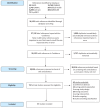The impact of psoriatic arthritis on quality of life: a systematic review
- PMID: 39717741
- PMCID: PMC11664531
- DOI: 10.1177/1759720X241295920
The impact of psoriatic arthritis on quality of life: a systematic review
Abstract
Background: Psoriatic arthritis (PsA) is a chronic inflammatory condition that can affect individuals of all ages. Patients may experience a range of physical and psychological issues.
Objective: To examine the impact of PsA on an individual's quality of life (QoL) and physical function.
Design: A systematic review of the literature.
Data sources and methods: A comprehensive search was conducted across seven electronic databases (Cochrane Central Register of Controlled Trials (CENTRAL), CINAHL, AMED, EMBASE, Global Health, MEDLINE and PsycINFO) to retrieve articles related to QoL and lifestyle in adults with PsA. The inclusion criteria were studies published between 2010 and 2021 that used outcomes validated in patients with PsA. The methodological quality was assessed using Joanna Briggs Institute Critical Appraisal Tools. Our primary outcomes were patient-reported outcomes (PROs) measuring QoL and the impact of disease on physical function. The secondary outcomes were assessments of fatigue, anxiety, depression, sleep, work productivity and employment.
Results: The study included 37 comprehensive studies that examined the impact of PsA on QoL and physical function. The findings revealed that the impact of PsA extends to various aspects of life, including activities of daily living, physical, and emotional aspects, such as fatigue, sleep disturbance, anxiety and depression. Notably, people with PsA experience reduced health-related quality of life (HRQoL), particularly in emotional, social and mental health aspects. The severity of pain and/or fatigue is directly linked to decreased HRQoL. Importantly, those who fail to achieve minimal disease activity face challenges in work productivity and employment status.
Conclusion: To conclude, our review underscores the significant impact of PsA on patients' HRQoL beyond joint disease. The emotional, social, and mental aspects of PsA require compassionate and holistic management.
Trial registration: The PROSPERO international prospective register of systematic reviews - CRD42021257395.
Keywords: health-related quality of life; patient-reported outcomes; psoriatic arthritis.
Plain language summary
The impact of psoriatic arthritis on quality of life Psoriatic arthritis (PsA) is a type of joint inflammation that happens in some people with psoriasis. About one in five people with psoriasis will get arthritis, but it's not clear why some people get it and others don’t. More than half of the patients with arthritis get joint damage, which can limit their daily activities. The main goal of treating patients is to improve their quality of life, help them function normally, and keep them productive at work. Unfortunately, the burden of psoriatic disease is often significant and reduces the quality of life for those affected. Patient questionnaires help evaluate how the disease is responding to treatment, its impact on quality of life, and its effect on patients’ well-being. In this review, we looked at existing research on how PsA affects patients’ quality of life. We identified 37 studies that were relevant to patients with PsA. We found that people with PsA generally have a lower quality of life, especially in terms of their emotions, social interactions, and mental well-being. Those who reported severe pain and fatigue also reported lower quality of life scores. Moreover, if their disease was poorly controlled, it negatively affected work productivity and employment satisfaction scores. Additionally, they reported difficulties with sleep, low mood, and challenges with sexual function. This review summarised that psoriatic arthritis greatly impacts patients’ quality of life and daily activities. Therefore, we suggest that along with regular check-ups, it’s important to address patients’ emotional, social, and mental aspects with compassionate care.
© The Author(s), 2024.
Conflict of interest statement
L.J.: none declared, L.H.H.: none declared, R.A: none declared, C.B. has received funds for research and honoraria from the following pharmaceutical companies: Abbvie, Almirall, Amgen (was Celgene), Beiersdorf, Janssen, Novartis, Pfizer, UCB, D.M.: none declared, S.K: none declared, D.O.: none declared, I.S.: none declared, R.S.: none declared, J.P.E.W.: none declared, A.V: none declared, L.C.C. has been paid as a speaker for AbbVie, Amgen, Biogen, Celgene, Eli Lilly, Galapagos, Gilead, GSK, Janssen, Medac, Novartis, Pfizer and UCB. L.C.C. has worked as a paid consultant for AbbVie, Amgen, Boehringer Ingelheim, Bristol Myers Squibb, Celgene, Eli Lilly, Gilead, Galapagos, Janssen, Moonlake, Novartis, Pfizer and UCB. L.C.C. has received grants/research support from AbbVie, Amgen, Celgene, Eli Lilly, Janssen, Novartis, Pfizer and UCB.
Figures

References
-
- Kane D, Stafford L, Bresnihan B, et al.. A prospective, clinical and radiological study of early psoriatic arthritis: an early synovitis clinic experience. Rheumatology (Oxford) 2003; 42(12): 1460–1468. - PubMed
-
- Zachariae H, Zachariae R, Blomqvist K, et al.. Quality of life and prevalence of arthritis reported by 5,795 members of the Nordic Psoriasis Associations. Data from the Nordic Quality of Life Study. Acta Derm Venereol 2002; 82(2): 108–113. - PubMed
-
- Husni ME, Merola JF, Davin S. The psychosocial burden of psoriatic arthritis. Semin Arthritis Rheu 2017; 47(3): 351–360. - PubMed
Publication types
Grants and funding
LinkOut - more resources
Full Text Sources
Research Materials
Miscellaneous

